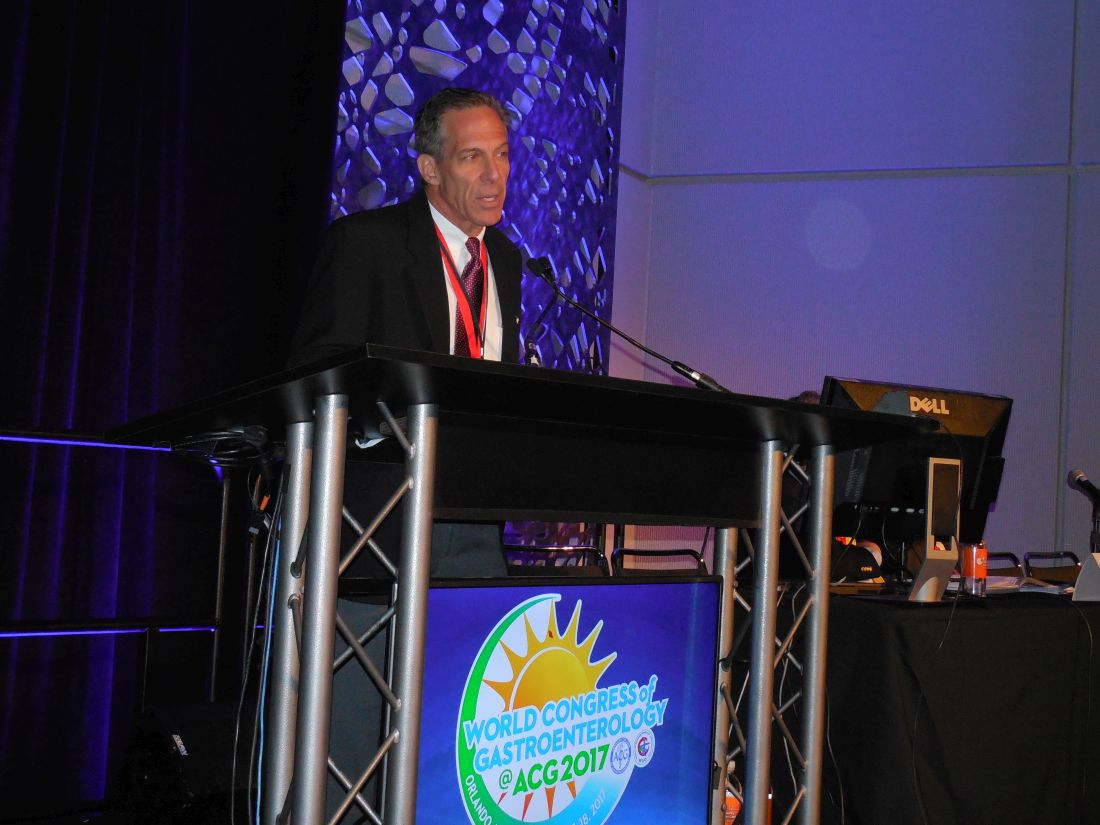User login
ORLANDO – Evidence supports “backing off” from screening colonoscopies every 5 years for patients who had one or two nonadvanced adenomas removed during a prior colonoscopy, Thomas F. Imperiale, MD, AGAF, said at the World Congress of Gastroenterology at ACG 2017.
He reported findings from more than 66,000 U.S. veterans followed at any one of 13 Veterans Affairs medical centers for an average of more than 7 years. The 10,220 patients who underwent a second screening colonoscopy after an index colonoscopy that led to removal of one or two nonadvanced adenomas had 0.16% colorectal cancer mortality, compared with 0.13% among 8,718 patients with a similar history who did not receive follow-up colonoscopy. The rate of colorectal cancer death was 0.12% among 47,629 control veterans who had no adenomas removed during their index colonoscopy.
In current U.S. practice, many gastroenterologists perform follow-up colonoscopy about 5 years after removing one or two nonadvanced adenomas during a screening colonoscopy, Dr. Imperiale said during a video interview. Deferring follow-up colonoscopy in the absence of any clinical indication seems advisable, he said, especially for older patients with two or more comorbidities who had a high-quality index colonoscopy with good preparation and good colonic visibility.
“We just can’t do colonoscopy for surveillance on this subgroup continuously; it doesn’t make sense,” he said.
No randomized trial results have documented the need for stepped up colonoscopies in patients with a history of one or two nonadvanced adenomas, and these new observational findings are consistent with prior observational reports.
“These data need to be integrated with common sense,” he said. An extended interval before repeat surveillance seems particularly appropriate for patients with a higher risk for adverse effects from the colonoscopy preparation and for patients more likely to die from a cause other than colorectal cancer.
Backing off on repeat colonoscopy “minimizes the harm from surveillance. As patients get older they don’t tolerate the prep as well. It grows more onerous, and the returns diminish,” Dr. Imperiale said.
The patients included in the review had their index colonoscopy performed during 2002-2009, when they averaged about 61 years old, and about 95% were men. Their average Charlson comorbidity index was about 1.3. The incidence of colorectal cancer during follow-up after the index colonoscopy was 0.18% in patients with one or two nonadvanced adenomas in their index examination and no follow-up colonoscopy, 0.71% in those with nonadvanced adenomas who had one or more subsequent colonoscopies, and 0.31% in the people with no adenomas removed during the index procedure.
The rates of all-cause death during follow-up of the three subgroups were notably different: 34% in those with nonadvanced adenomas and no repeat colonoscopy, 13% in patients with nonadvanced adenomas and repeat colonoscopy, and 21% in those without nonadvanced adenomas. Dr. Imperiale discounted the significance of comparing rates of all-cause mortality, stressing that the most relevant primary endpoint is colorectal cancer mortality.
Dr. Imperiale reported having no disclosures.
mzoler@frontlinemedcom.com
On Twitter @mitchelzoler
The video associated with this article is no longer available on this site. Please view all of our videos on the MDedge YouTube channel
ORLANDO – Evidence supports “backing off” from screening colonoscopies every 5 years for patients who had one or two nonadvanced adenomas removed during a prior colonoscopy, Thomas F. Imperiale, MD, AGAF, said at the World Congress of Gastroenterology at ACG 2017.
He reported findings from more than 66,000 U.S. veterans followed at any one of 13 Veterans Affairs medical centers for an average of more than 7 years. The 10,220 patients who underwent a second screening colonoscopy after an index colonoscopy that led to removal of one or two nonadvanced adenomas had 0.16% colorectal cancer mortality, compared with 0.13% among 8,718 patients with a similar history who did not receive follow-up colonoscopy. The rate of colorectal cancer death was 0.12% among 47,629 control veterans who had no adenomas removed during their index colonoscopy.
In current U.S. practice, many gastroenterologists perform follow-up colonoscopy about 5 years after removing one or two nonadvanced adenomas during a screening colonoscopy, Dr. Imperiale said during a video interview. Deferring follow-up colonoscopy in the absence of any clinical indication seems advisable, he said, especially for older patients with two or more comorbidities who had a high-quality index colonoscopy with good preparation and good colonic visibility.
“We just can’t do colonoscopy for surveillance on this subgroup continuously; it doesn’t make sense,” he said.
No randomized trial results have documented the need for stepped up colonoscopies in patients with a history of one or two nonadvanced adenomas, and these new observational findings are consistent with prior observational reports.
“These data need to be integrated with common sense,” he said. An extended interval before repeat surveillance seems particularly appropriate for patients with a higher risk for adverse effects from the colonoscopy preparation and for patients more likely to die from a cause other than colorectal cancer.
Backing off on repeat colonoscopy “minimizes the harm from surveillance. As patients get older they don’t tolerate the prep as well. It grows more onerous, and the returns diminish,” Dr. Imperiale said.
The patients included in the review had their index colonoscopy performed during 2002-2009, when they averaged about 61 years old, and about 95% were men. Their average Charlson comorbidity index was about 1.3. The incidence of colorectal cancer during follow-up after the index colonoscopy was 0.18% in patients with one or two nonadvanced adenomas in their index examination and no follow-up colonoscopy, 0.71% in those with nonadvanced adenomas who had one or more subsequent colonoscopies, and 0.31% in the people with no adenomas removed during the index procedure.
The rates of all-cause death during follow-up of the three subgroups were notably different: 34% in those with nonadvanced adenomas and no repeat colonoscopy, 13% in patients with nonadvanced adenomas and repeat colonoscopy, and 21% in those without nonadvanced adenomas. Dr. Imperiale discounted the significance of comparing rates of all-cause mortality, stressing that the most relevant primary endpoint is colorectal cancer mortality.
Dr. Imperiale reported having no disclosures.
mzoler@frontlinemedcom.com
On Twitter @mitchelzoler
The video associated with this article is no longer available on this site. Please view all of our videos on the MDedge YouTube channel
ORLANDO – Evidence supports “backing off” from screening colonoscopies every 5 years for patients who had one or two nonadvanced adenomas removed during a prior colonoscopy, Thomas F. Imperiale, MD, AGAF, said at the World Congress of Gastroenterology at ACG 2017.
He reported findings from more than 66,000 U.S. veterans followed at any one of 13 Veterans Affairs medical centers for an average of more than 7 years. The 10,220 patients who underwent a second screening colonoscopy after an index colonoscopy that led to removal of one or two nonadvanced adenomas had 0.16% colorectal cancer mortality, compared with 0.13% among 8,718 patients with a similar history who did not receive follow-up colonoscopy. The rate of colorectal cancer death was 0.12% among 47,629 control veterans who had no adenomas removed during their index colonoscopy.
In current U.S. practice, many gastroenterologists perform follow-up colonoscopy about 5 years after removing one or two nonadvanced adenomas during a screening colonoscopy, Dr. Imperiale said during a video interview. Deferring follow-up colonoscopy in the absence of any clinical indication seems advisable, he said, especially for older patients with two or more comorbidities who had a high-quality index colonoscopy with good preparation and good colonic visibility.
“We just can’t do colonoscopy for surveillance on this subgroup continuously; it doesn’t make sense,” he said.
No randomized trial results have documented the need for stepped up colonoscopies in patients with a history of one or two nonadvanced adenomas, and these new observational findings are consistent with prior observational reports.
“These data need to be integrated with common sense,” he said. An extended interval before repeat surveillance seems particularly appropriate for patients with a higher risk for adverse effects from the colonoscopy preparation and for patients more likely to die from a cause other than colorectal cancer.
Backing off on repeat colonoscopy “minimizes the harm from surveillance. As patients get older they don’t tolerate the prep as well. It grows more onerous, and the returns diminish,” Dr. Imperiale said.
The patients included in the review had their index colonoscopy performed during 2002-2009, when they averaged about 61 years old, and about 95% were men. Their average Charlson comorbidity index was about 1.3. The incidence of colorectal cancer during follow-up after the index colonoscopy was 0.18% in patients with one or two nonadvanced adenomas in their index examination and no follow-up colonoscopy, 0.71% in those with nonadvanced adenomas who had one or more subsequent colonoscopies, and 0.31% in the people with no adenomas removed during the index procedure.
The rates of all-cause death during follow-up of the three subgroups were notably different: 34% in those with nonadvanced adenomas and no repeat colonoscopy, 13% in patients with nonadvanced adenomas and repeat colonoscopy, and 21% in those without nonadvanced adenomas. Dr. Imperiale discounted the significance of comparing rates of all-cause mortality, stressing that the most relevant primary endpoint is colorectal cancer mortality.
Dr. Imperiale reported having no disclosures.
mzoler@frontlinemedcom.com
On Twitter @mitchelzoler
The video associated with this article is no longer available on this site. Please view all of our videos on the MDedge YouTube channel
AT THE WORLD CONGRESS OF GASTROENTEROLOGY
Key clinical point:
Major finding: Colorectal cancer mortality was 0.13% in patients without follow-up colonoscopy and 0.16% in patients who had a second colonoscopy.
Data source: Review of 66,567 people at 13 U.S. VA Medical Centers.
Disclosures: Dr. Imperiale reported having no disclosures.

